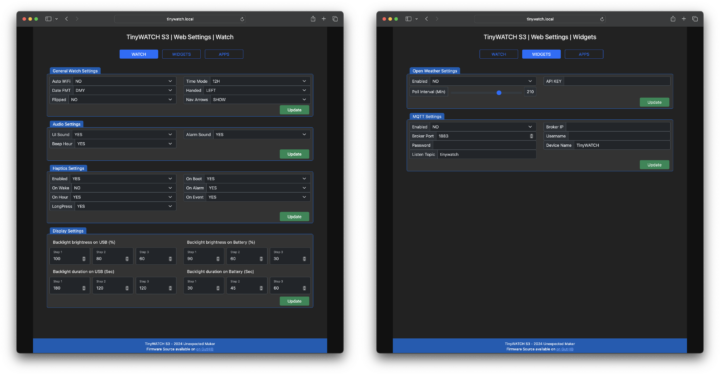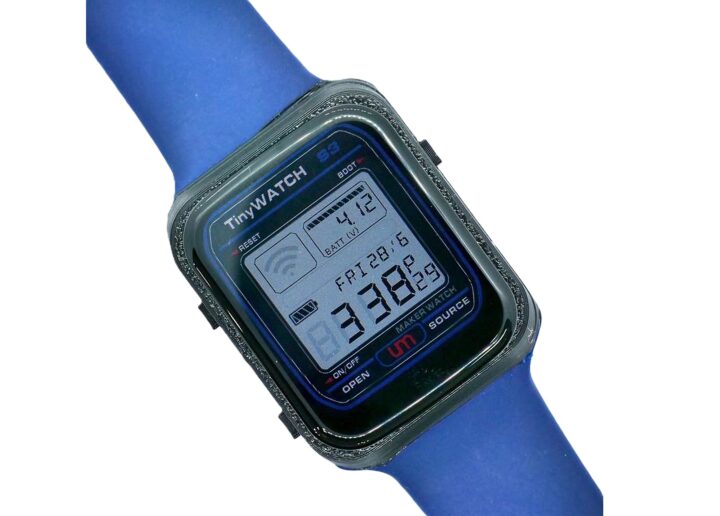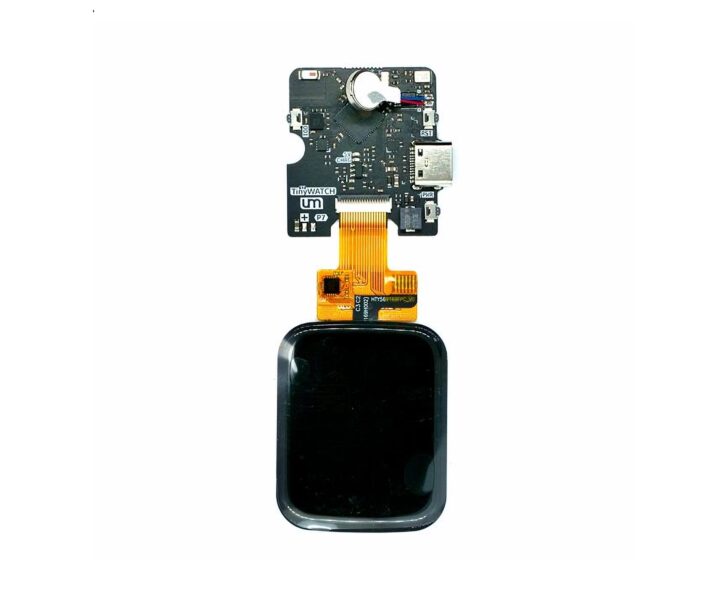The TinyWatch S3 is an ESP32-S3 development board in a smartwatch form factor from Seon Rozenblum, also known as Unexpected Maker.
It is powered by the ESP32-S3 wireless microcontroller with 8MB quad SPI flash storage and 2MB of additional QSPI PSRAM. It features a 240 x 280 LCD with capacitive touch (via a CST816T module) and several onboard sensors including a 6-axis inertial measurement unit, a magnetometer, and a MEMS microphone. It has a USB-C port for power, programming, and charging a connected LiPo battery (250mAh or 500mAh). While the product’s firmware is still in active development, it is usable as a watch and even a daily driver.
The TinyWatch S3 is described as a “wrist-wearable ESP32-S3 development board” but lacks pin headers and is not breadboard compatible. The hardware is open-source but the product is mostly useful for firmware development, testing, and other general projects.
The firmware is being developed in the PlatformIO environment and requires extensive knowledge of C++ and the ESP32 Arduino Core framework. The firmware currently only supports basic functionality, such as telling the time in digital and analog format, adding widgets for weather and battery status, and a simple app framework with an audio visualization app, a compass, and a sample “Hello World” app. Apps are built into the firmware, rather than being standalone. It also offers a web interface for configuring items that may be hard to set up on the watch such as API keys for OpenWeather.

TinyWatch S3 specifications:
- SoC – ESP32-S3 SoC, Xtensa dual-core 32-bit LX7 microcontroller, up to 240 MHz; 512KB SRAM; 8MB QSPI flash; Wi-Fi 4 + Bluetooth 5.0 (LE); 45 programmable GPIOs
- Memory – 2MB additional QSPI PSRAM
- Display – 240 x 280 ST7789 Display, Capacitive Touch (CST816T)
- USB – USB-C connector for power and programming, reverse USB back-feed protection
- Misc
- Clock – I2C Low Power RTC (RV-3028-C7)
- Sensors – I2C 6-axis IMU (BMI270), I2C Magnetometer (MMC5603), I2S MEMS Microphone (ICS-43434)
- Feedback – Magnetic Buzzer, Haptics Motor (DRV2605L)
- Buttons – Power On/Off Button, Reset Button, Boot Button
- ESD protection on USB and buttons, 2x LEDs (5V Power and Charge), 3D High Gain Antenna
- Power and Charging
- Reverse USB back-feed protection
- 5V Power via USB-C
- LiPo Battery Charging; I2C Battery Fuel Gauge (MAX1704X)
The GitHub repository contains KiCAD design files and schematics, firmware files, STL and STEP files for the case, and example projects. We have seen other ESP32-based smartwatches such as the LilyGO T-Watch S3, MutantW V1, and the LilyGo Open-Smartwatch.
The TinyWatch S3 smartwatch can be bought from Lectronz or the Unexpected Maker website for $59. The watch ships pre-assembled in a 3D-printed case but no watch band or battery is included.

Tomisin is a writer specializing in hardware product reviews, comparisons, and explainers. He is very passionate about small form factor and single-board computers.
Support CNX Software! Donate via cryptocurrencies, become a Patron on Patreon, or purchase goods on Amazon or Aliexpress







I love this, but it’s be even better with an epaper display
And it would be even better with something else than S3 🙂 Whole ESP32 family is not designed for battery, especially when wifi/ble is enabled.
Not true. The low energy co-processor is very battery efficient, if the software utilizes it correctly.
Can you run any code in the co-processor, or is it still just a wake-up source?
The biggest problem is the actual ble ip, which is sub-par in regards to power-efficiency. A basic ble application uses like 10x more power than nrf53
You can’t do much from code running on coprocessor. Also by ‘not designed’ I mean even official Espressif material, it is targeted for wired stuff like smart sockets, lightbbulbs, ble/zigbee/mesh gateways to wifi and so on, please let me know if you find some reference to small battery powered devices in their material. There are much better chips for smartwatches that should last more than just a few hours while still connected to your phone or other devices.
I differ,been developing on esp32 since years and realised that esp is popular only because of Arduino ide support
What do you make of Jakob Krantz’s ZSWatch?
Seems like a very good platform.
It’s already at v5 but since it’s GPLv3 licensed, I’m hoping someone ports Infinitime to it and replaces the screen with an e-paper display…
Sorry, I don’t get the “smartwatch” thing.
It still needs my phone to do anything interesting so why not just use my phone?
The thing I might find interesting is wrist based data storage; universally accessible from multiple devices — but noone seems to support it.
Lots of people don’t wear a watch because their phone provides the same functionality. The “smart watch” looks kinda dumb because it duplicates phone functionality while offering a less capable interface.
I find it more convenient than a smartphone as I can check the time quickly, and I get notifications (including OTP messages) directly on my smartwatch, so I don’t need to open (or find) my phone. It’s also better for fitness tracking.
This is awesome I can totally see wanting to flaunt my Seon Rozenblum watch, which instead of Steps, Pulse and pressure, (blood) Glucose, ECG, Falls and Wrecks will tell me if magnetic treasures are nearby, if it’s too loud or quiet or something (what, no speaker and spoken time in Korean or Hebrew?) and time and weather plus haptic notifications or such? (Oooh, QSPI is the bus and PSRAM is self-refresh DRAM “pseudostatic”. Wiring 45 GPIO left as an exercise to the swimmer tho…)
Looking for that case dress (Stuart Semple blacks whites and epaper accents?) and second thumb (plus inertial and myoelectric sensors.)